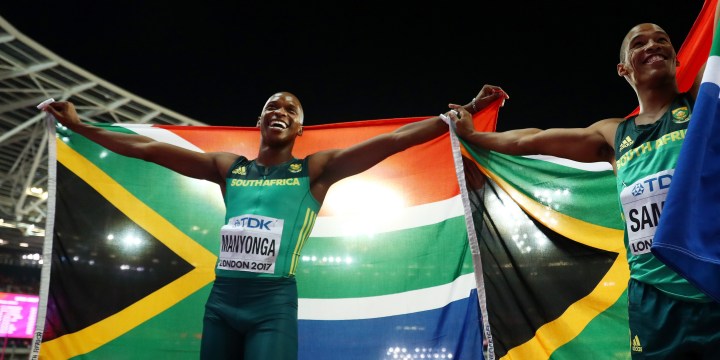DRUG-FREE SPORT
Anti-doping laws could lead to SA suspension from international sports events

The SA Institute for Drug-Free Sport has officially been notified that the country no longer complies with global anti-doping policies.
Can you imagine the Springboks not playing international rugby after 2024? Or South Africa’s athletes either being unable to compete under the national flag or, worse, being suspended from world events altogether?
And no, this has nothing to do with South Africa’s cosy relations with Russia (although that might become an issue in months to come), but something far more prosaic and easily rectifiable – anti-doping legislation.
The South African Institute for Drug-Free Sport (Saids) recently received its first official warning from the World Anti-Doping Agency (Wada) that its policies are no longer “compliant” in the battle against doping.
Although these scenarios appear dramatic, the reality is that there is an urgent need for the country to update its anti-doping policy code to comply with Wada rules.
Gabon lost its Wada privileges this week because its anti-doping legislation is noncompliant and it has done nothing about it. The first step in Gabon’s “punishment” is that it can have no representatives on Wada boards or committees or hold any office at the agency.
This may seem a toothless punishment, but it’s the first step in a 12-month process that could lead to Gabon’s suspension from all international competition.
If South African sports federations, under the umbrella of the South African Sports Confederation and Olympic Committee (Sascoc), do not implement an amended anti-doping policy, athletes could fall foul of Wada’s regulations and therefore be ineligible to compete.
Saids, which is an independent body that oversees the anti-doping programme, started the process of drafting a new sports integrity bill last year. It held its first formal gathering with federations and Sascoc in Johannesburg on 25 November 2022.
Earlier this month, the institute sent out a draft bill to all federations and Sascoc. They have until 5 May for comments and amendments. After that deadline, Saids will review comments and inputs and make changes where appropriate.
A second and final round of consultation will then take place before the final proposed legislation is sent to the government to be reviewed and adopted by Parliament.
First warning letter
“We have received a first ‘warning’ letter of noncompliance from Wada pertaining to our existing anti-doping legislation from 1997,” Saids chief executive Khalid Galant confirmed in an email to Daily Maverick.
“That legislation is obsolete and currently noncompliant with the World Anti-Doping Code. Wada has given us until June 2024 to correct the noncompliance before South Africa may face the prospect of being declared noncompliant with the code.
“Should we be declared noncompliant, SA’s participation in the 2024 Paris Olympic and Paralympic Games may come under threat,” said Galant.
South Africa’s “noncompliance” sounds more serious than it is. In reality, nothing changes on an operational level for Saids because it’s a continuation of the good anti-doping work it already does, but the amendments are needed to satisfy the pedantic nature of legal documents.
“The overwhelming majority of the noncompliant findings by Wada of our current act are along the lines of ‘the definition must be updated to reflect the exact wording in the Wada Code’, or some definition or term in the Act is obsolete and no longer used,” Galant told Daily Maverick.
“So the noncompliance pertains to the text and has no bearing on the operational ability or jurisdictional mandate of Saids.”
But it must be done, and to change the Act of Parliament requires all federations and Sascoc to approve changes.
South Africa is compelled to comply as a signatory to the International Convention Against Doping in Sport, adopted by the General Conference of the United Nations Educational, Scientific and Cultural Organisation in Paris on 19 October 2005.
Wada’s revised anti-doping code came into effect on 1 January 2021 and all member countries are expected to comply. To date, more than 700 sporting bodies and federations have accepted the new code.
Saids has drafted a sport integrity bill to ensure that South African sport is internationally compliant in combating the use of prohibited substances and athletes’ methods of obtaining them.
And though there is a temptation to shrug shoulders at these changes, given the complex nature of doping cases when they reach arbitration or a court, every possible legal angle must be covered in the legislation.
To meet the standards of the new Wada code, Saids has proposed the establishment of a body called Sports Integrity South Africa to oversee anti-doping compliance.
New jurisdiction
The proposed new body will expand oversight and policing into other areas such as match fixing and dispute resolution.
“South Africa is also lagging in the international trend of appropriately legislating and regulating against various additional threats to sport integrity that are independent of government and national sports federations,” Galant said in a letter to federations.
“The proposed legislation, through the mechanisms it has created, intends to create an independent process to adjudicate on matters in sport pertaining to unfair discrimination and safeguarding, and to combat, more broadly, other illegal activities such as match fixing, fraud and corruption.”
According to the 47-page document sent to federations and Sascoc, “the jurisdiction and authority of Sports Integrity South Africa will, over time, come to include other measures and address other threats to sport integrity. A national independent sports arbitration tribunal, to be known as the National Sport Arbitration Chamber, will be established.
“The National Sport Arbitration Chamber will take over and continue with the adjudication of anti-doping rule violations, currently being conducted by Saids tribunals and its Appeal Board, in terms of the existing SAIDS rules.”
The idea behind the new body is simply to broaden the independent work Saids does by offering conflict resolution devices for athletes and federations alike.
Safe-guarding young athletes from coaching abuse is a key theme of the proposal. Most federations do not have the budget and manpower to police all aspects needed to be compliant with world standards.
The new body is hopefully going to provide legal, medical and psychological support to those who need it.
At the first meeting last year, Sascoc supported the proposed changes and representatives of federations were also positive. They are also aware that they have little option but to adopt Wada’s new doping code in the short term, but in the longer term the establishment of Sports Integrity South Africa is a chance to overhaul the entire industry.
Larger, more well-heeled sports such as rugby and cricket have the ability to offer athletes support through trade unions such as MyPlayers and the South African Cricketers’ Association.
But for smaller sports, being able to turn to an independent body such as the proposed National Sport Arbitration Chamber to settle potentially costly disputes is a needed step.
First things first, though; Sascoc and the member federations must adopt Wada’s new code or face the potential of international sporting isolation. DM168
This story first appeared in our weekly Daily Maverick 168 newspaper, which is available countrywide for R25.




















 Become an Insider
Become an Insider
Another greylisting concern… or more like what greylisting concerns?